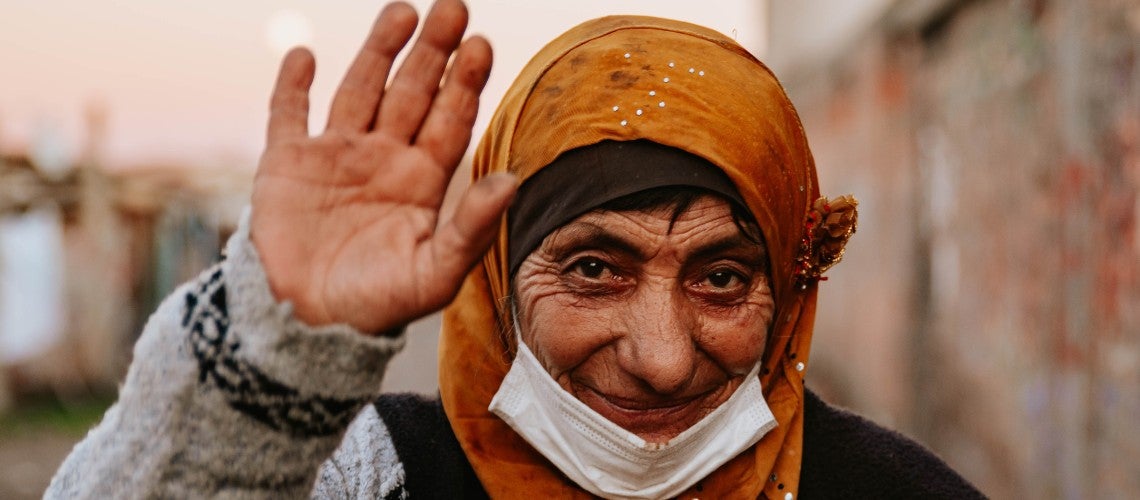 A Turkish woman who received a digital government payment for social assistance waives at the camera
A Turkish woman who received a digital government payment for social assistance waives at the camera
When a country is hit with a crisis, a situation we all know too well with COVID-19, identifying those most in need and making payments to them through social assistance programs are core to combating the shock. Yet, many countries continue to grapple with this challenge.
In the first year of the pandemic, an estimated 1.7 billion people in low-and middle-income countries lived in households that received COVID-related social assistance payments. The need to respond quickly and safely brought to light the importance of investments in digital systems such as ID, payments, and trusted data sharing. A recent study showed that among 85 countries analyzed, those that were able to use digital databases and trusted data sharing to identify beneficiaries reached, on average 51 percent of their population. In comparison, countries that had to collect new information from beneficiaries and couldn’t rely on existing databases reached, on average, only 16 percent of their population. Türkiye exemplifies how digital public infrastructure established during normal times can be leveraged for more responsive, inclusive, and efficient delivery of social assistance when faced with a crisis.
Similar to other countries across the globe, lockdowns and movement restrictions brought on by COVID resulted in declining economic conditions for many in Türkiye. This called for the increase and expansion of social assistance to those most impacted by the pandemic. Having interoperable digital platforms and information systems already in place, thanks to decades of investment in modernization, allowed for the seamless flow of information or trusted data sharing across different government databases , integral to social assistance program delivery. As a result, Türkiye was well positioned to rapidly expand coverage of social assistance , according to a recent case study by the World Bank’s G2Px initiative. For beneficiaries, access to digital systems resulted in a fairly smooth process from application to payment delivery (see box below). Across the different COVID response programs from the start of the pandemic, a total of 7.2 million households received social assistance payments from the government.
Based on our research, five key digital enablers have been critical to Türkiye’s social assistance response:
- The Integrated Social Assistance System (ISAS) processes applications and payments for at least fifty of Türkiye’s social protection programs. Compared to the previous paper-based systems, a beneficiary now only needs their ID, decreasing the number of documents from seventeen to one, the time to apply from days to minutes, and the time to process applications and deliver the benefits from months to days.
- The foundational identification (ID) system provides a reliable and unique ID for all persons that can be used, with appropriate data protection measures, to cross-reference information across relevant databases.
- The national address system creates a registry of unique addresses. It is interoperable with ISAS, hence dynamic updates to individual and household profiles are captured to easily inform eligibility, apply different program rules, and update beneficiary profiles for any given social assistance program.
- Social Assistance and Solidarity Foundations (SASFs) provide localized decision-making on each recipient’s eligibility. SASFs are responsible for intake and registration, assessments of needs, eligibility, and grievance redressal for social assistance across programs.
- The Treasury Single Account covers all public resources and facilitates electronic fund transfers from the Central Bank to the banking system, which in turn sends the allocated funds to recipients. From wherever a particular program has its account, payments can be made either directly into the recipient’s bank account; to a prepaid card associated with that recipient’s ID number, for withdrawal from an ATM with an ID number only (cardless pickup); or delivered at home by program staff for certain social assistance programs.
The Five Steps Applicants Took to Apply for COVID-19 Emergency Social Assistance:
Step 1. Log in to the e-government portal via www.turkiye.gov.tr.
Step 2. Click on the COVID-19 Social Support Program.
Step 3. Fill in the required information (ID number, name, account number, etc.).
Step 4. Applicants are informed about the result of their application through SMS, and registration is completed.
Step 5. Payments are made either into a recipient’s postal bank prepaid card (if they were existing recipients of a social assistance program), bank accounts, or, for some, delivered directly at home.
As countries continue to cope with the COVID-19 pandemic and tackle the multiple crises associated with rising inflation and food security, questions around how to identify and help those in need remain pertinent. Türkiye provides a great example of how a modern ecosystem for social assistance payment delivery is not a single all-encompassing system but instead federates multiple existing government databases leveraging systems that are designed to be interoperable and serve multiple use cases (not only social assistance). This calls for a whole-of-government approach, requiring integration across the ecosystem: robust social protection and payments infrastructure at the national, regional, and local levels; a trusted and inclusive ID system; and strong data-sharing protocols and infrastructure. These building blocks enable timely social assistance, which is essential to build back better and create a resilient society.
Related:
Deep Dive into the Ecosystem for the Delivery of Social Assistance Payments: Türkiye Case Study




Join the Conversation